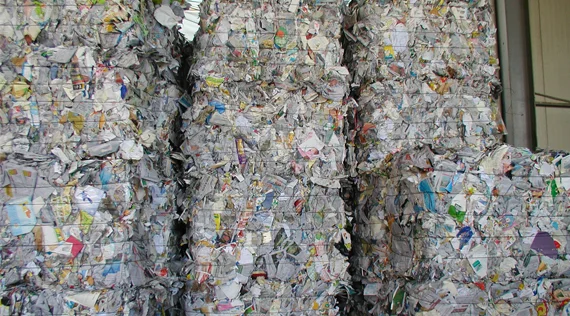
SEATTLE (Scrap Monster): With both plastic production and waste projected to escalate to unmanageable levels by 2050, scientists at UC Santa Barbara and UC Berkeley have launched a new AI-powered online tool that provides unprecedented insight into how the nations of the world can combine policies to end plastic pollution with the United Nations global plastics treaty, currently under negotiation. In March 2022, more than 175 nations agreed to develop the international, legally-binding treaty to end plastic pollution. Sixty of these nations, from the United Arab Emirates to Palau, have committed to achieving this by 2040.
Researchers say that if no action is taken, annual plastic production will rise 22% between 2024 and 2050, and plastic pollution will jump 62% between 2024 and 2050. By continuing business as usual, the world would generate enough litter between 2010 and 2050 to cover the entire island of Manhattan with a 3.5 kilometer-tall heap of plastic — nearly 10 times the height of the Empire State Building.
But, the scientists say, a strong UN plastics treaty that incorporates the right mix of nine plastic reduction policies could see plastic pollution virtually eliminated in 2040, with the generation of mismanaged waste reduced by 89% to a more manageable 10 million metric tons per year.
At the same time, the research finds that a business-as-usual scenario places the greatest burden of mismanaged plastic waste — waste that is littered or not properly disposed of, leading to polluted waterways and overflowing landfills — on less wealthy countries. Without intervention, mismanaged waste in the Global South will be 4.8 times greater in 2050 than in NAFTA countries, the 30 countries in the European Union, and China combined in 2050. Such a future further exacerbates similar types of disproportionate environmental justice harms already created by climate change.
“The developing countries house much more of the world population than NAFTA and EU combined,” said Nivedita Biyani, a researcher on global plastic modeling at the UC Santa Barbara-based Benioff Ocean Science Laboratory (BOSL). “If they start using plastics at the rates that NAFTA and EU are, we will be in much more trouble. That said, there is a way out of this mess. By including all the policies outlined, we can reach a near-zero mismanaged waste scenario. I hope world leaders in NAFTA and the EU will commit to a high ambition treaty to help other countries leap-frog their way out of this.”
The new tool and underlying analysis were developed by a team of plastic researchers, data scientists and AI researchers at BOSL, the Bren School of Environmental Science & Management at UC Santa Barbara, and the Eric and Wendy Schmidt Center for Data Science & Environment at UC Berkeley. Using machine learning to combine information about population growth and economic trends to forecast the future of plastic production, pollution and trade, the tool projects global and regional plastic pollution trends from 2010 to 2050, 10 years beyond the High Ambition Coalition’s 2040 goal of ending plastic pollution.
This interactive model, released as negotiators head to Nairobi, Kenya, for the first round of plastics treaty negotiations, reveals a host of policy insights that can help shape the UN treaty.
“Finally solving the plastics crisis means a win for the environment, a win in our fight against climate change, and a healthier and more just future for all people,” said Douglas McCauley, director of BOSL and an associate professor at UC Santa Barbara. “A weak treaty would be worse than no treaty at all. But I was so thrilled to see scientific proof that a strong treaty could virtually end the problem of plastic waste forever. Nothing makes me happier than knowing that my generation could be the last generation to live with the cancer of plastic pollution. I can only hope the nations meeting in Nairobi pay attention to these findings.”
“I confess that when I first saw these nations promising to end plastic pollution by 2040, I thought that this would be impossible,” added McCauley, also an adjunct professor at UC Berkeley. “I was blown away to discover a pathway to near-zero in this research.”
Courtesy: www.universityofcalifornia.edu



| Copper Scrap View All | |
| Alternator | 0.40 (0) |
| #1 Copper Bare Bright | 4.17 (-0.03) |
| Aluminum Scrap View All | |
| 356 Aluminum Wheels (Clean) | 0.81 (0) |
| 6061 Extrusions | 0.71 (0) |
| Steel Scrap View All | |
| #1 Bundle | 360.00 (0) |
| #1 Busheling | 380.00 (0) |
| Electronics Scrap View All | |